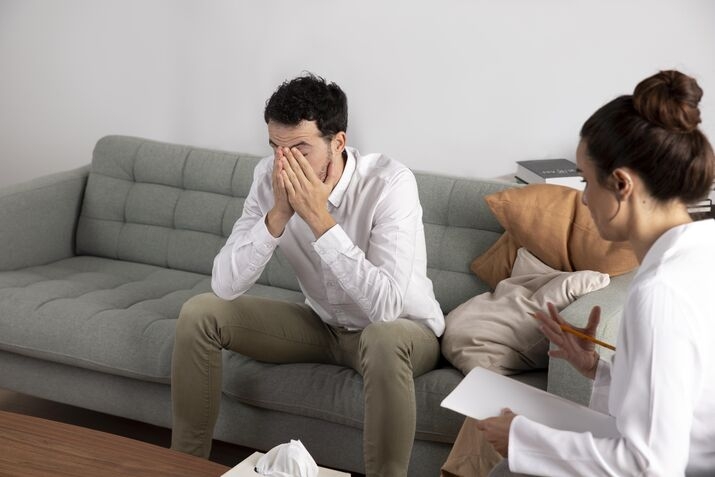Key Highlights
- Therapy is essential for treating anxiety and depression, offering more comprehensive care than medication alone.
- Anxiety and depression share symptoms like worry and sadness, impacting people of all ages.
- Psychological treatments help increase self-awareness and develop coping skills for better emotional well-being.
- Interpersonal Therapy (IPT) improves mental health by addressing and resolving relationship issues.
- Various therapies, such as CBT, Psychodynamic Therapy, and Mindfulness-Based Therapies provide specific approaches to treat mental distress.
- The blog emphasizes the power of psychology for anxiety and depression, creating long-term strategies for managing mental health, including coping mechanisms and relapse prevention.
Anxiety and depression are two of the most common mental health disorders that make a huge impact on an individual’s well-being and daily life. These conditions have various symptoms like excessive worrying, fear, sadness, loss of interest or pleasure, and major changes in appetite or sleeping patterns.
Even though medication is an effective way to treat anxiety and depression, psychological interventions, such as therapy, are crucial in improving mental health. This blog explores the power of psychology for anxiety and depression and how therapy helps you explore your mental health potential.
Understanding Anxiety and Depression
Anxiety and depression can have a severe impact on your life. These mental health challenges are so closely related, having nearly identical symptoms but both affect individuals deeply regardless of age and background.
What is Anxiety?
Humans are good at worrying about the future, but what difference does it make? It only leads to restlessness, a rapid heartbeat, and difficulty concentrating. Excessive worry or fear about future events interferes with daily activities. For some people, the constant worry about how the future will turn out reaches such an extent that they need help.
What is Depression?
Recent studies show that approximately 17.3 million adults in the United States experience at least one major depressive episode annually. This statistic highlights the impact of deteriorating mental health worldwide. Persistent sadness, loss of interest in activities, and changes in energy levels, appetite, and sleep are all prominent symptoms of depression. Depression affects the well-being, thoughts, behavior, and feelings of individuals.

Benefits of Psychology for Anxiety and Depression
You cannot underestimate the power of psychology for anxiety and depression. This treatment approach offers several benefits that support individuals struggling with these mental health conditions. Psychological strategies provide valuable insights on improving and managing mental health.
The power of psychology for anxiety and depression can be seen in the following benefits:
Increased Self-Awareness
You can explore more about your thoughts, emotions, and behaviors when given a safe and supportive environment. Therapy creates this supportive environment for you where you can look into the underlying causes that trigger anxiety and depression. Understanding an individual’s mental health is important for effective management.
Coping Skills Development
The power of psychology for anxiety and depression needs to be properly utilized in treatment plans, one can develop coping skills that include cognitive restructuring, emotion regulation, relaxation techniques, problem-solving skills, and communication skills. These anxiety management techniques are key tools for improving emotional well-being and empowering individuals to cope with the symptoms and challenges that come their way.
Improved Emotional Well-Being
Emotional health is linked to physical health. Effective psychological techniques help people learn to recognize and express their emotions in healthy ways, among other skills that improve emotional control. The outcome is enhanced emotional health and a more flexible approach to managing anxiety and depression. Developing these skills fosters a healthier mind and supports long-term mental wellness.
Enhanced Interpersonal Relationships
IPT is an approach that helps individuals improve their relationships by addressing and resolving interpersonal issues. They are major contributors to anxiety and depression. Improved interpersonal relationships can have a positive impact on an individual’s mental health. It is a crucial element of psychological therapy that benefits a lot.
Increased Self-Care and Self-Compassion
A good life starts with acknowledging yourself. Making self-compassion and self-care a priority is crucial in improving mental health. Psychological therapies can help people set appropriate boundaries, prioritize self-care activities, and practice self-compassion. All of this helps with depression and anxiety. These tactics align with the natural ways to improve mental health.
Long-Term Strategies for Managing Anxiety and Depression
Developing healthy coping skills, recognizing and addressing triggers, and creating a relapse prevention strategy are all long-term approaches to treating anxiety and depression. Even when treatment sessions are ended, these techniques support maintaining improvements in mental health. When necessary, incorporating strategies like ADHD assessments can help enhance general emotional health.

Approaches That Work Best
Mental health can be managed using various methods beyond traditional medicine. The following have been proven to be successful in treating various mental health issues.
Cognitive Behavioral Therapy (CBT)
CBT is an evidence-based approach that focuses on identifying and changing negative thought patterns and behaviors to treat anxiety and depression. It helps individuals reframe negative thoughts, develop problem-solving skills, and gradually expose themselves to situations they fear the most.
Interpersonal Therapy (IPT)
Psychologists address the underlying root causes of depression to improve interpersonal relationships. The only way to do this is to explore IPT. It enhances communication, resolves relationship conflicts, and builds supportive connections.
Psychodynamic Therapy
Childhood experiences can cause trauma, and as time passes, these incidents become unresolved conflicts and affect an individual’s personality. Psychodynamic is an approach that taps into the unconscious patterns and resolves underlying emotional conflicts.
Mindfulness-Based Therapies
Acknowledging and accepting the present is something individuals suffering from anxiety and depression struggle with. Mindfulness therapies like Mindfulness-Based Stress Reduction (MBSR) and Acceptance and Commitment Therapy (ACT) develop self-compassion and gratefulness of the present.
Anger Management Therapy
Anger management therapy is also an approach that supports emotional well-being. Its primary focus is on managing anger constructively, improving communication skills, and cultivating emotional regulation.
IV Therapy for Emotional Well-Being
IV therapy for emotional well-being is a great approach, too. As we all know, mental and physical health are linked together, so the nutrients released in the bloodstream positively impact energy levels, mood regulation, and stress resilience.

